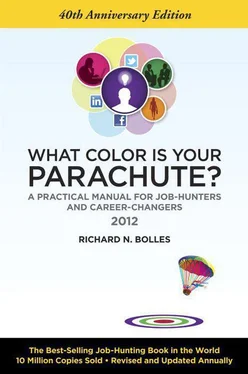In better times, economically, it was common for job-hunters to believe that job-search on the Internet worked for most everybody, so when they found that it didn’t work for them, they obsessed over the question: “What’s wrong with me?” Result: lowered self-esteem, or even mammoth depression. Yuck!
In hard times, we expect that job-search on the Internet won’t work well for just about everybody. Why? Because we think there just are no jobs out there. Okay, and why do we think that? The answer: Mythology.
The common myth among job-hunters is that if an employer has a vacancy, they will post it on the Internet—on their own site, if nowhere else. Not true . Employers will only post their vacancies on the Internet, or anywhere else, if they are having trouble finding the kind of hire that they are looking for.
Otherwise, they fall back to their default position: filling it without advertising it. This creates what we might call an underground job-market, which historically has been called the “hidden job market.” Because of this mythology, job-hunters think that if there are no postings, there are no jobs available. Not true . The vacancies have just gone underground.
Only a 7% Success Rate
2. Posting or mailing out your resume to employers.This job-search method apparently has about a 7 percent success rate. That is, out of every 100 job-hunters who use only this search method, 7 will get lucky, and find a job thereby; 93 job-hunters out of 100 will not—if they use only resumes to search for those vacancies that are out there. This comes as a shock to most job-hunters. Everyone and his brother tell us: a good resume will get you a job. It’s virtually an article of faith among the unemployed. Why does everyone keep telling us this, if it’s not true? Oh, why did everyone entrust their money to Bernie Madoff? Or why did so many people buy those incredibly risky financial instruments that led to the Recession? You tell me.
Resumes make you feel like they’re out there, working for you. They make you feel as though you’re really doing something about your jobhunt. But in fact they may be moribund or comatose. That is, they may not be getting read, at all, even when posted on an employer’s own website. As for posting on general sites, well, they won’t tell you their success rate, but back before this curtain of silence fell, Pete Weddle, an expert on recruiting, got some resume sites on the Internet to tell him how many employers actually looked at the resumes on their sites at that time. Sit down while I tell you the news from back then: A site that had 85,000 resumes posted, only 850 employers looked at any of those resumes in the previous three months before the survey. Another site with 59,283 resumes posted, only 1,366 employers looked at any, in the previous three months. Another site with 40,000 resumes, only 400 employers in three months. A site with 30,000 resumes, only 15 employers looked in, during the previous three months.
So, you post your resume on the Internet, confident that employers are reading them, when—in a depressing number of cases—nobody is. Some employers, in fact, hate resumes (I kid you not). So many lies, on so many resumes. Or at least exaggeration and distortion of job-hunters’ actual experience and knowledge. As much as 82 percent of the time, according to some experts.
( Anyway, the success rate is sad. And actually I’m being generous here with my reported percentage. One study suggested that outside the Internet only 1 out of 1,470 resumes actually resulted in a job. Another study said the figure was even worse: one job offer for every 1,700 resumes floating around out there. We do not know what the odds are if you post your resume on the Internet. We do know that once you post your resume on the Internet, it gets copied quickly by “spiders” from other sites, and you can never remove it completely from the Internet. There are reportedly at least 40,000,000 resumes floating around out there in the ether, like lost ships on the Sargasso Sea. No one’s bothered to try to count how many of those 40,000,000 actually turned up a job for the job-hunter .)
Only a 7% Success Rate
3. Answering ads in professional or trade journals, appropriate to your field.This search method, like the one above, apparently has about a 7 percent success rate. That is, out of every 100 job-hunters who use only this search method, 7 will get lucky and find a job thereby; 93 job-hunters out of 100 will not—if they use only this method to search for the vacancies that are out there.
Only a 5 to 24% Success Rate
4. Answering local newspaper ads.This search method apparently has about a 5 to 24 percent success rate. That is, out of every 100 job-hunters who use only this search method, between 5 and 24 will get lucky and find a job thereby; 76 to 95 job-hunters out of 100 will not—if they use only this method to search for the vacancies that are out there.
( The fluctuation between 5 percent and 24 percent is due to the level of salary that is being sought; the higher the salary being sought, the fewer job-hunters who are able to find a job using only this search method .)
Only a 5 to 28% Success Rate
5. Going to private employment agencies or search firms for help.This method apparently has about a 5 to 28 percent success rate—again depending on the level of salary that is being sought. Which is to say, out of every 100 job-hunters who use only this method, between 5 and 28 will get lucky and find a job thereby; 72 to 95 job-hunters out of 100 will not—if they use only this method to search for those vacancies that are out there.
(The range is for the same reason as noted in #4. It is of interest that the success rate of this method apparently has risen slightly in recent years, in the case of women but not of men: before the recession, 27.8 percent of female job-hunters found a job within two months, by going to private employment agencies .)
Other Job-Hunting Methods in the Least Effective Category: For the sake of completeness we should note that there are at least four other methods for trying to find jobs, that technically fall into this category of Worst Ways. Those four are:
Going to places where employers pick out workers, such as union halls.This apparently has about an 8 percent success rate. ( Only 11.9 percent of U.S. workers are union members , [13]but it is claimed that those who do have access to a union hiring hall, have a 22 percent success rate. What is not stated, however, is how long it takes to get a job at the hall, and how short-lived such a job may be; in the trades it’s often just a few days.)
Taking a civil service examination.This apparently has about a 12 percent success rate.
Asking a former teacher or professor for job-leads.This also has about a 12 percent success rate.
Going to the state or federal employment service office.This apparently has about a 14 percent success rate.
THE FIVE BEST WAYS TO HUNT FOR A JOB
Okay, so much for the apparently least effective ways to hunt for the vacancies that are out there. But now, let’s look at the other side of the coin. What are the job-hunting methods that have a better payoff, for the time and energy you invest in them?
Here are some educated guesses about the five best:
33% Success Rate
1. Asking for job-leads from: family members, friends, people in the community, staff at career centers—especially at your local community college or the high school or college where you graduated.You ask them one simple question: do you know of any job vacancies at the place where you work—or elsewhere? This search method apparently has about a 33 percent success rate. That is, out of every 100 people who use this search method, 33 will get lucky, and find a job thereby; 67 job-hunters will not—if they use only this method to search for those vacancies that are out there.
Читать дальше












